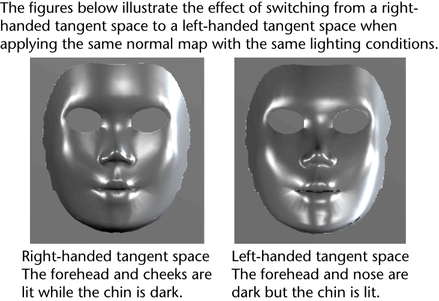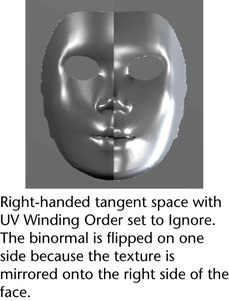You can control how Maya sets tangent space for the polygon models in your scenes. The Tangent Space attributes are set within the Tangent Space section on the polyShape node for the mesh.
By default, Maya uses a right-handed tangent space. That is, the normal, tangent, and the binormal form a right-handed coordinate system.
However, if you are working in an environment that requires a left-handed tangent space (for example, the game engine you are using mandates that you use a left- handed system, or you are incorporating normal maps into your scene from other applications that are based on a left-handed system), then setting this option to left-handed ensures that the tangent space is calculated so that the normal, tangent, and the binormal always form a left-handed coordinate system.

For a description of UV winding order, see Display UV winding order in the Mapping UVs guide.
In situations where the UV winding order of a face is reversed (that is, counter-clockwise), a straightforward left or right-handed tangent calculation results in a flipped binormal.

By selecting the UV Winding Order Detect option, Maya will calculate the binormal based on the V direction of the UV mapping.

You can modify the default preferences by selecting Window > Settings/Preferences > Preferences, and selecting the Modeling category. In the Polygon Tangent Space section you can set the default coordinate system and winding order that Maya uses for Polygon meshes.
Specifies an angle below which tangents are smoothed. The default setting of 0 leaves the tangent space along UV borders and mirrored edges unsmoothed. Increasing this value smooths those regions which may help to remove artifacts in bump maps, normal maps and other advanced lighting models caused by tangent space seams.
Specifies an angle below which the normals are considered equivalent when calculating tangent space. The default setting of 0 ensures that all hard edges results in a tangent space seam. Increasing this value may help to eliminate the appearance of hard seams when vertex normals are not shared across an edge.
Many interactive games/interactive applications that use tangent space export a single snapshot of the tangent data at either the bind or rest pose for the mesh and deform based on that data. As a result, any artifacts introduced will not be visible in the final game.